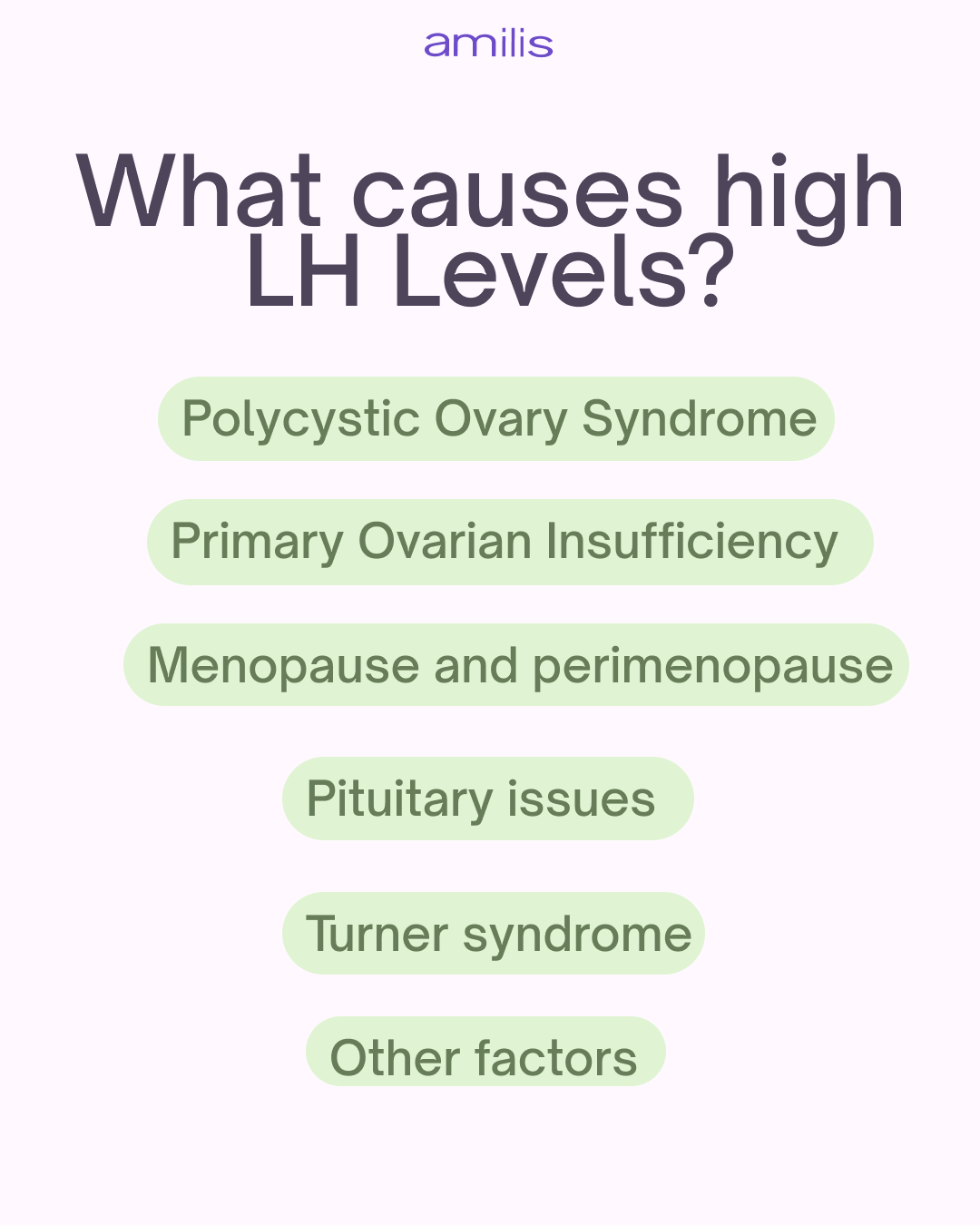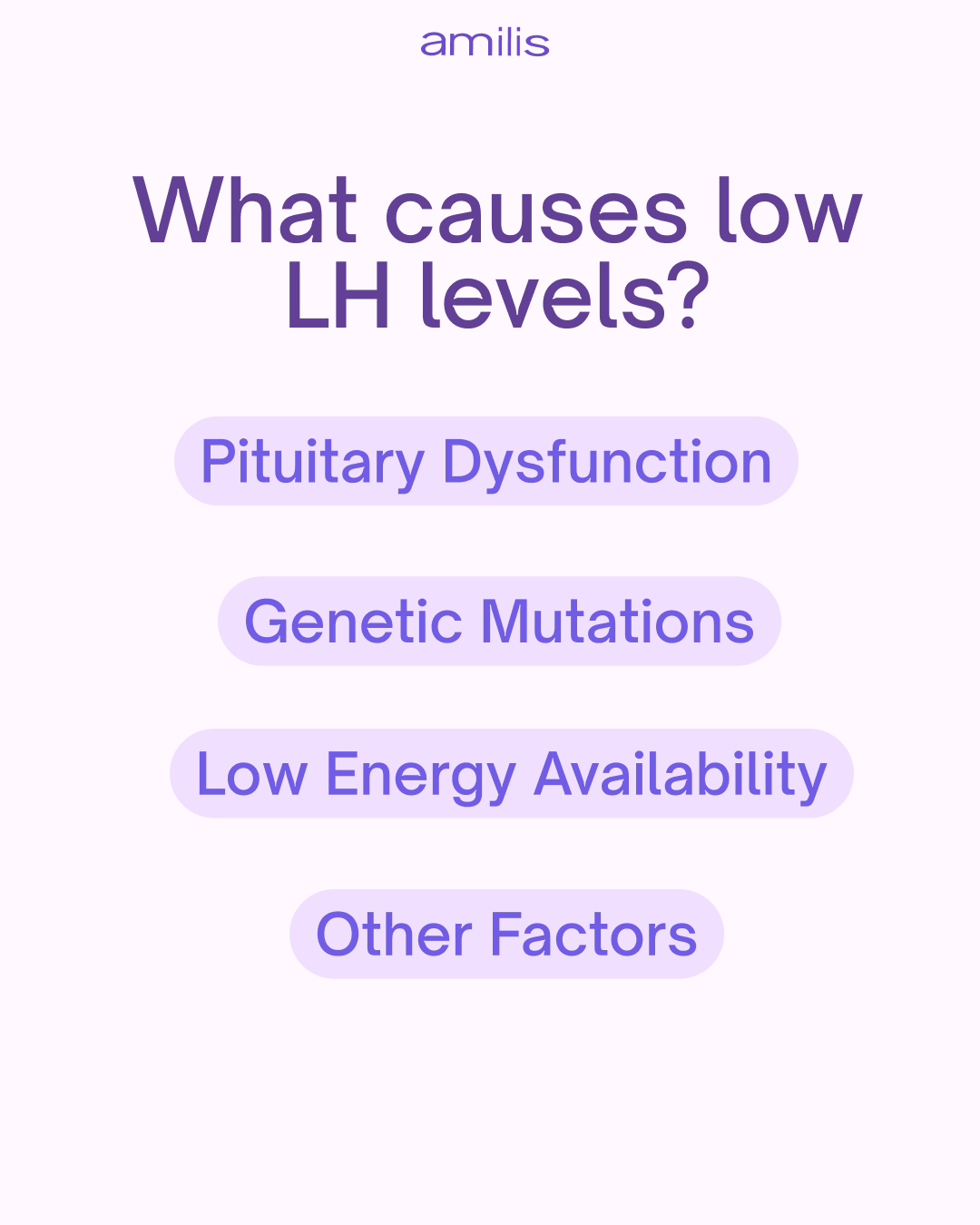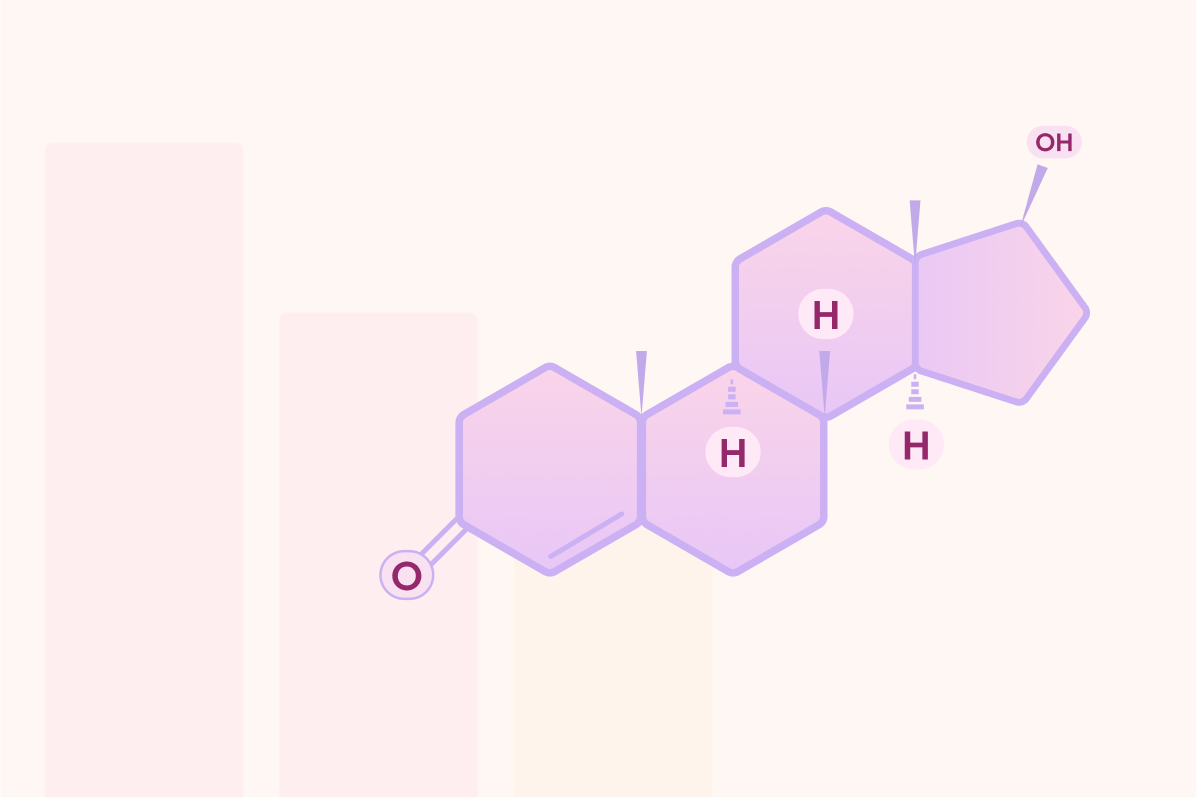Contents
- What is luteinizing hormone?
- What does luteinizing hormone do?
- What do normal LH levels look like?
- Normal LH levels by age (+chart)
- How to know my LH levels?
- When should I take an LH test?
- What causes high LH levels?
- What are the symptoms of high LH levels?
- What causes low LH levels?
- Symptoms of low LH levels
- How to increase LH levels
- LH levels and egg freezing
- Get your fertility tested in the UK, via Amilis
- Frequently asked questions
In an eggshell...
- LH, or Luteinizing Hormone, is produced by the pituitary gland and serves as the key trigger for ovulation
- Baseline LH levels are usually checked on day 3 of your menstrual cycle
- If your baseline LH is in the normal range (2.4-12.6 IU/L), you’ll likely respond well to the stimulation medications and potentially get more mature eggs per cycle
LH, or luteinizing hormone, is like the conductor of an orchestra, coordinating the final crescendo of your menstrual cycle.
AKA, it triggers ovulation and helps release a mature egg every month.
In fact, it works hand-in-hand with FSH and other hormones to rise and fall during different phases of your menstrual cycle.
Given that LH is a part of the hormonal headquarters that governs our cycles, it naturally plays a crucial role in helping us understand our hormonal health better, and during the egg freezing process.
So we're here with this breakdown on LH levels, how and when to test them, what the results mean, and how they impact your fertility!
Let's dive in!
What is Luteinizing Hormone?
LH, or Luteinizing Hormone, is produced by the pituitary gland and serves as the key trigger for ovulation in your menstrual cycle.
Here's how it works:
Every month, a bunch of follicles get recruited by the ovaries in a race to release the mature egg. As follicles grow, they are initially dependent on FSH (follicle-stimulating hormone) to help them grow.
🥚 As follicles mature, they become increasingly sensitive to LH
📈 The dominant follicle produces rising levels of oestrogen (E2)
⚡ When oestrogen reaches a critical threshold, it triggers an LH surge
💥 This LH surge causes the follicle to rupture and release the mature egg—aka ovulation!
🌟 LH levels then decrease and help form the corpus luteum (the last stage of the follicle that has released the egg), which produces progesterone
LH levels remain relatively low throughout most of your cycle, but they spike drastically (the famous "LH surge") about 24 to 36 hours before ovulation. This makes it a crucial marker for tracking ovulation when trying to conceive.
What Does Luteinizing Hormone Do?
Apart from having its own “LH phase” of the menstrual cycle, the effects of LH also extend to these:
- Triggers ovulation: The LH surge is what actually causes the detachment of the mature egg from the follicle. LH also weakens the ovarian wall for the mature egg to pass through and reach the fallopian tube.
- Forms the corpus luteum: After ovulation, LH helps transform the empty dominant follicle into the corpus luteum, a temporary hormone-producing structure.
- Supports progesterone production: The corpus luteum, under LH's influence, produces progesterone to maintain the uterine lining. (It’s like: hey, we MIGHT have a baby incoming, so better be ready!)
- Coordinates with other hormones: LH works alongside FSH, oestrogen, and progesterone to maintain your menstrual cycle.
What do Normal LH Levels in Females Look Like?
Just like the other hormones, LH levels change during different phases of the menstrual cycle. Here’s an overview:
Normal LH Levels by Age (+Chart)
As our body goes through different life stages, our hormone levels, including LH naturally change as well. Here's what to expect:
How to Know My LH Levels?
Checking your LH levels is pretty straightforward and involves a simple blood test at your doctor's office or clinic.
A healthcare professional will draw a small blood sample from a vein in your arm using a needle. You might feel a brief pinch, but the entire process takes less than 5 minutes.
When Should I Take an LH Test?
The best time to take your LH test really depends on what you and your doctor are hoping to learn from it. Here's a quick breakdown:
Are you wondering about your overall fertility health?
In this case, you can either go for a full hormone panel (like the one Amilis offers, at just £130) on day 3 of your menstrual cycle or visit a clinic. For reference, you need to count the first day of your period as day 1.
Even when you visit a clinic, they usually test several hormones, such as your FSH and estradiol together, not just LH. This helps them get a snapshot of your reproductive health when everything is at its "baseline" or resting state. These hormonal levels are an indicator of what “normal” looks like for you.
Are you trying to conceive and want to time ovulation?
This one takes a little more planning, but this is where you’ll start testing daily around day 10-12 of your cycle, usually using ovulation predictor kits.
For example, if you have a 28-day cycle, you'd probably ovulate around day 14, so starting to test on day 11 or 12 would catch that surge. The goal is to spot the LH surge with the kit, so you get a 12 to 24-hour heads up that ovulation might occur soon.
Has your doctor mentioned specific concerns?
Sometimes your healthcare provider might have you come in at specific times based on symptoms you're having or if they're investigating something particular. Maybe you've been having irregular periods, or they want to rule out certain conditions. In these cases, they'll give you clear instructions about exactly when to come in.
Basically, your LH levels are constantly changing during different phases of your cycle
This is why doctors often test multiple hormones at once and are pretty specific about timing. They're trying to see how all your hormones work together and compare your levels to what's expected for that particular point in your cycle.
What Causes High LH Levels?

If your LH test came back high, you're probably wondering what that means. In general, elevated LH levels usually point to specific, treatable conditions. Here are the most common causes:
PCOS (Polycystic Ovary Syndrome)
This is the most common reason for high LH in women of reproductive age. With PCOS, your body produces more LH compared to another hormone called FSH - often 2 or 3 times as much. This imbalance is part of what causes irregular ovulation and many PCOS symptom, like irregular periods.
Primary Ovarian Insufficiency (POI)
This occurs when your ovaries stop functioning normally before age 40, losing their ability to produce eggs and hormones as they should. When your ovaries aren't responding normally, your pituitary gland tries harder by sending out more LH to wake them up. This affects about 1 in 100 women under 40.
Menopause and Perimenopause
As you approach menopause, your ovaries produce less oestrogen. Your pituitary gland notices this and cranks up LH production to try stimulating your ovaries back into action. During perimenopause, LH levels fluctuate a lot, and after menopause, they stay consistently high.
Pituitary Issues
Sometimes the problem isn't with your ovaries but with your pituitary gland itself. Certain pituitary tumours (such as gonadotroph adenomas) or disorders can cause LH overproduction, though this is much less common.
Turner Syndrome
This genetic condition affects the X chromosome and often leads to ovaries that don't develop properly. Your body responds by producing more LH, especially during teenage years and beyond, when ovarian function would normally increase.
Other Factors
Your doctor might also consider lifestyle factors like smoking, excessive alcohol, or intense/strenuous exercise, as well as certain genetic or autoimmune conditions that can affect hormone levels.
We get it- abnormal results can feel overwhelming. But this information can give you and your doctor valuable clues about what’s happening and how to treat it better.
What are the Symptoms of High LH Levels?
High LH levels don't always cause obvious symptoms on their own, but they're often part of hormonal imbalances that can affect how you feel. Here's what you might notice:
- Irregular or absent periods - Your cycle might become unpredictable or stop altogether.
- Difficulty conceiving - High LH can interfere with regular ovulation, making it harder to get pregnant.
- Hot flashes or night sweats - You might experience these menopause-like symptoms even if you're young.
- Mood swings - Hormonal changes can make emotions feel more intense than usual.
- Reduced libido - You may notice a decreased interest in sex.
- Vaginal dryness - This can make intimacy uncomfortable.
- Hair changes - You might experience hair loss or unwanted hair growth in new places.
What Causes Low LH Levels?

Understanding why your LH levels might be low can give you a better picture of your health and guide you toward the right treatment or support. Here are some common reasons this can happen:
Hypothalamic or Pituitary Dysfunction
Think of your hypothalamus and pituitary gland as the master control system for your reproductive hormones. When these areas aren't functioning properly, they can't produce or release enough LH, which typically shows up as low or normal gonadotropin levels paired with low estradiol.
This condition, called hypogonadotropic hypogonadism, can stem from functional issues like chronic stress or poor nutrition, or from more serious organic causes like tumours or brain injuries.
Interestingly, chronic liver diseases such as alcoholic and non-alcoholic cirrhosis can also mess with this hypothalamo-pituitary axis, disrupting the normal LH signalling your ovaries depend on.
Lastly, it can also be due to genetic causes such as Kallman syndrome, a rare genetic condition affecting GnRH production, and resulting in low LH and FSH levels
Genetic Mutations
Sometimes the problem is with our blueprint or the genetic code. Rare inactivating mutations in either the LH beta subunit (LHB) gene or the LH receptor (LHCGR) gene can cause persistently low LH levels. Either your body can't make functional LH or your ovaries can't respond to it properly, resulting in persistently low effective LH levels
While these mutations are uncommon, it’s worth investigating, especially in cases of unexplained infertility or oligo-amenorrhea (infrequent or absent periods).
Low Energy Availability
Your reproductive system is remarkably sensitive to how much energy you're giving your body. When you don't consume enough calories or exercise excessively, it disrupts LH pulsatility - essentially throwing off the regular rhythm of LH pulses your body needs.
This reduces both pulse frequency and overall LH levels.
Other Contributing Factors
The ageing process naturally diminishes LH action over time, and in some cases, chronic physical or emotional stress can disrupt the delicate hormonal balance, suppressing LH production.
Symptoms of Low LH Levels
Low LH levels might present as:
- Absent or irregular periods - Your cycle may become irregular or stop completely.
- Difficulty getting pregnant - Low LH impairs the LH surge required for ovulation, thereby preventing it and making conception challenging.
- Decreased libido - LH deficiency leads to less oestrogen production, resulting in decreased libido.
- Fatigue - Persistent tiredness due to hormonal insufficiency affecting energy metabolism.
- Mood changes - You might feel more irritable, anxious, or depressed.
- Hot flashes - Menopause-like symptoms, due to low oestrogen, a side effect of LH deficiency.
- Vaginal dryness - Oestrogen deficiency from low LH reduces vaginal lubricaion, making intimacy uncomfortable or painful.
How to Increase LH Levels
If you have low LH levels, treatment depends on the underlying cause:
- Lifestyle modifications: Reducing stress, maintaining a healthy weight, and moderating exercise intensity can help normalise LH levels.
- Hormonal therapy: Your doctor might prescribe medications like clomiphene citrate or letrozole to stimulate LH production during ovarian stimulation.
- GnRH therapy: In cases of hypothalamic dysfunction, GnRH pump therapy might be recommended as it can mimic the body’s natural rhythms and restore LH (and FSH) secretion to normal levels.
- Treating underlying conditions: Addressing conditions like eating disorders (anorexia nervosa), thyroid problems (hypothyroidism), or pituitary disorders (pituitary insufficiency) can help restore normal LH levels.
- Nutritional support: Ensuring adequate nutrition, particularly sufficient calories and healthy fats, supports hormone production.
LH Levels and Egg Freezing: What's the Connection?
Now, let's explore how LH levels relate to your egg freezing journey.
Understanding your LH levels can provide valuable insights for egg freezing success:
Baseline Assessment
Before you start your egg freezing cycle, your doctor will check your LH levels on day 3 of your cycle, along with a few other hormones. Normal baseline LH levels generally indicate that your ovaries should respond well to the stimulation medications you'll be taking.
LH Surge Monitoring
Here's something that might surprise you: during your egg freezing cycle, your medical team keeps a close eye on your LH levels.
Why? Because if your LH starts rising too early, it could trigger ovulation before your egg retrieval surgery - and that would mean fewer eggs to freeze.
Your body naturally wants to ovulate, but for egg freezing, we want to collect those eggs before that happens. So monitoring LH helps ensure everything stays on track.
Protocol Optimization
Not everyone gets the same egg freezing protocol, and your LH levels help explain why. Some women might benefit from LH supplementation during their egg freezing cycle, while others do better with protocols that suppress LH to prevent that early surge we mentioned.
Timing Egg Retrieval
Your doctor will use your LH levels, along with ultrasounds and other bloodwork, to determine exactly when to schedule your retrieval - typically 34-36 hours after your trigger shot.
This precise timing helps ensure your eggs are at just the right stage of maturity for freezing.
Predicting Response
Research shows some interesting patterns about LH levels and egg freezing outcomes:
If your baseline LH is in the normal range (2.4-12.6 IU/L): You'll likely respond well to the stimulation medications and potentially get more mature eggs per cycle.
If your LH is higher than normal: Your doctor might need to adjust your protocol to prevent cycle complications or poor egg quality.
If your LH is lower than normal: You might benefit from additional LH support during your cycle to optimize your results.
Get Your LH Levels Tested in the UK, via Amilis
Getting your LH levels tested is a part of the puzzle when it comes to your fertility.
While LH is important, it works best when checked alongside other fertility markers like FSH, AMH, and estradiol to give you the complete picture of your reproductive health.
If you're considering testing your fertility or hormone health, here’s how you can start that journey via Amilis:
- Zero waiting times, and the option to book a full hormone panel at just £130 (50% cheaper than fertility clinics) or an AMH test at just £80 anytime, at your convenience (via Randox and accredited labs across the UK- aka, they get accepted by most fertility clinics)
- A personalised report on your hormone levels and what your hormone levels could mean for your fertility
- Get a free follow-up or book a free consultation with expert doctors, and with the best fertility clinics across the UK
And the team at Amilis is here for you throughout! We’re combining the care you deserve and packaging it into every step of your fertility journey, right from the start!
Figuring out where to get started? Book a doctor consultation or take our personalised fertility quiz to know more!
Frequently Asked Questions
What is a high LH level?
A high LH level depends on the phase of your menstrual cycle and your age. During the follicular phase, LH levels above 12.6 IU/L might be considered elevated. However, during the LH surge (ovulation), levels can naturally reach 95.6 IU/L or higher. Consistently high baseline LH levels might indicate conditions like PCOS or approaching menopause.
What's the treatment for low LH levels in females?
Treatment for low LH levels depends on the underlying cause. Options include lifestyle modifications (stress reduction, maintaining healthy weight), hormonal therapy (clomiphene citrate, letrozole), GnRH therapy for hypothalamic dysfunction, or treating underlying conditions like eating disorders or pituitary problems. Your doctor will determine the best approach based on your specific situation.
What's the normal LH and FSH levels in females?
Normal levels vary by menstrual cycle phase. During the follicular phase: LH ranges from 2.4-12.6 IU/L and FSH from 1.4-9.9 IU/L. During ovulation: LH surges to 14.0-95.6 IU/L while FSH reaches 6.2-17.2 IU/L. In the luteal phase: LH drops to 1.0-11.4 IU/L and FSH to 1.1-9.2 IU/L. Post-menopause, both hormones are elevated.
What LH level indicates ovulation?
Ovulation is indicated by the LH surge, where levels typically rise to 14.0-95.6 IU/L. However, the surge is relative to your baseline - it's usually 2-3 times higher than your normal levels. Most ovulation predictor kits detect the surge when LH reaches about 20-25 IU/L, though this varies between individuals.
How long after LH surge do you ovulate?
Ovulation typically occurs 24-36 hours after the LH surge begins. The egg is usually released about 10-12 hours after the LH peak. This timing makes the LH surge a reliable predictor for fertility tracking, though individual timing can vary slightly.
How long does LH surge last?
The LH surge typically lasts 12-24 hours, though it can extend up to 36 hours in some women. The surge begins gradually, peaks, and then drops back to baseline levels. This relatively short window is why daily testing is important when tracking ovulation with LH tests.



.png)



.png)


